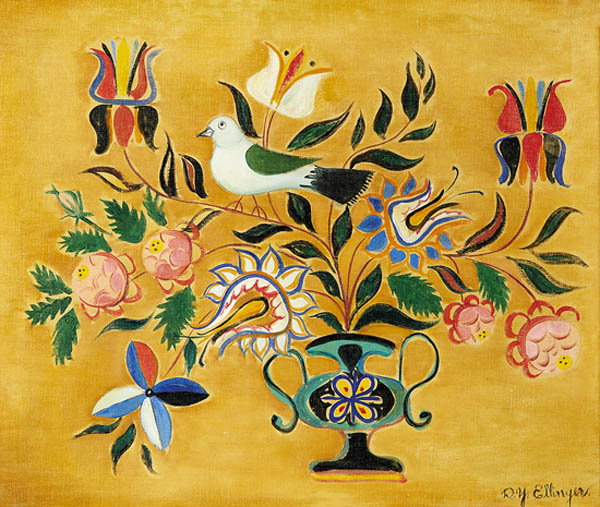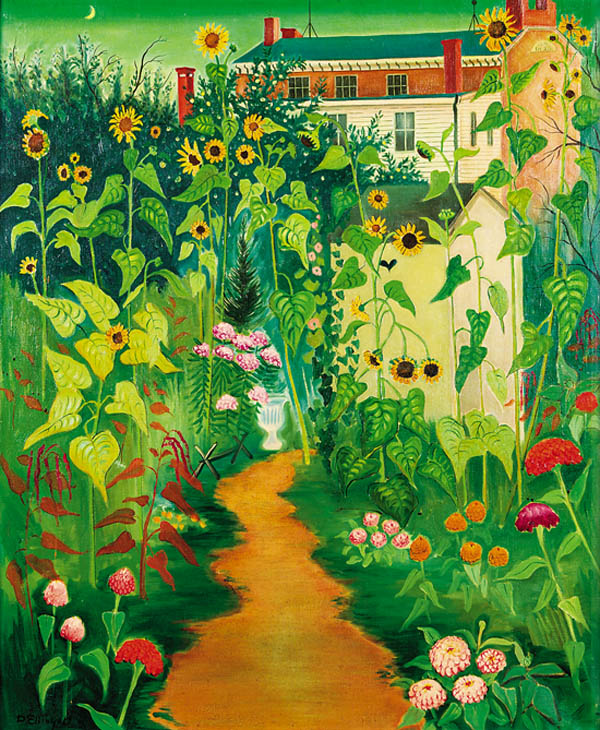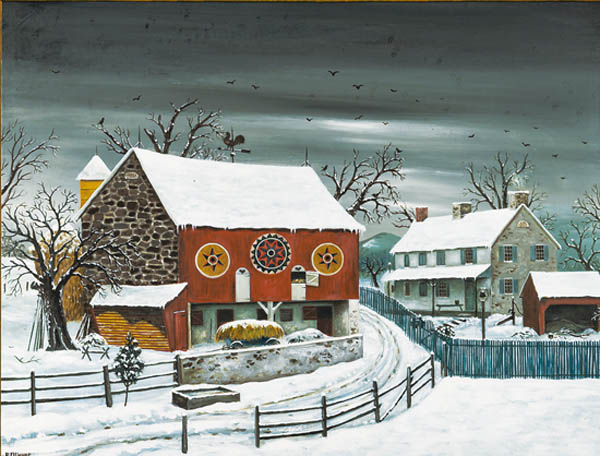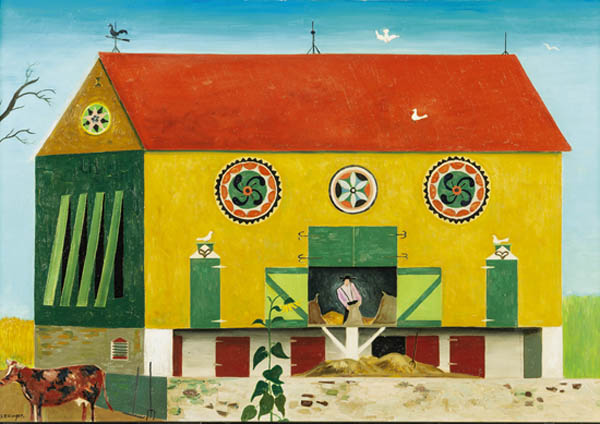Native Son: The Life And Art Of David Ellinger
Landmark Exhibition Of 20th Century Pennsylvania German Folk Art Opens At Historic Trappe On Sept. 30
By Lisa Minardi - October 06, 2023
Historic Trappe in Trappe, Pa., is delighted to announce a significant retrospective exhibition featuring more than 100 works that promises to be a journey through time, shedding light on the life and work of a self-taught folk artist, David Ellinger (19132003). Curated by Lisa Minardi, executive director of Historic Trappe and a distinguished scholar of Pennsylvania German culture, Native Son: The Life and Art of David Ellinger stands as a testament to the enduring allure of Pennsylvania German folk art. A fully illustrated catalogue authored by Minardi and available exclusively at Historic Trappe will provide a comprehensive study of Ellingers life and work. The exhibition opens Saturday, Sept. 30, and will be on view through July 28, 2024. The Ellinger Aesthetic Ellinger left an indelible mark on the world of folk art. His humble beginnings in Trappe, Pa., saw him embark on a creative journey that would later become a bridge between generations and cultures. With no formal training, Ellingers innate talent and keen eye for detail propelled him into the world of art. Ellingers journey as an artist accelerated in 1935 when employed by the Works Progress Administration (WPA) to contribute to the Index of American Design project. His artistic prowess rapidly gained recognition, leading to a series of solo exhibitions in prominent art hubs such as Philadelphia and New York during the mid-1940s. Ellingers canvases, depicting picturesque scenes of Pennsylvania German barns, country auctions, Amish family farms, and other rustic vistas, played a pivotal role in kindling widespread fascination with Pennsylvania German culture during the latter half of the 20th century. His work resonated deeply with an audience captivated by folk art and nostalgic reverence for an agricultural past. Characterized by vibrant colors and adorned with Pennsylvania German motifs, including birds, tulips, and hearts, Ellingers prolific output, totaling over 6,000 paintings by his own estimation, continues to captivate collectors of folk art and Americana. Native Son: The Life and Art of David Ellinger marks the third installment of special exhibitions organized by Historic Trappes Center for Pennsylvania German Studies. Minardi meticulously selected over 100 pieces from Ellingers oeuvre to trace the evolution of his artistic journey. She embarked on a tireless quest to assemble works from Ellingers scattered private collections, interviewing relatives and collectors with personal connections with the artist. Additionally, Minardi delved into Ellingers personal archives, unearthing precious details about his life and artistic vision. A Chronicle of Masterpieces Contributions from nearly a dozen private collectors and members of the Ellinger family have enriched the exhibition, offering a comprehensive view of Ellingers artistic evolution, including his early childhood drawings and sketches. Visitors will have the opportunity to explore a diverse array of media, encompassing oil paintings, watercolors, cutworks, theorem paintings (executed in oil-on-cotton velvet using a series of stencils), colored pencil creations, and even a unique crayon drawing, alongside woodblock prints and a captivating weathervane. Highlighted among these masterpieces are Ellingers early 1930s oil paintings, featuring a captivating portrait of George Washington and an evocative depiction of Washington and his horse in front of the local Augustus Lutheran Church. The exhibitions centerpiece is Ellingers iconic 1943 masterpiece, Out of the Heart Comes the Issues of Life, inspired by Proverbs 4:23: Keep thy heart with all diligence, for out of it are the issues of life. Additional exhibition highlights include botanical drawings from 1927, created when Ellinger was a mere 14 years old; impressionist landscapes and still lifes from the 1930s and 40s; the painting River Brethren, a stark modernist rendering of a local meetinghouse from 1935; and The Quilt, one of Ellingers earliest works featuring Amish subjects, dated 1943. Other work includes Garden Path, ca. 1945, one of Ellingers most extensive and detailed creations, Flowers I Grew, a still life painted shortly after Ellingers first home purchase in 1945; Fertile Moon, ca. 1950, a modernist portrayal of a Pennsylvania German farm; and Cornucopia from 1958, one of Ellingers earliest theorem paintings. Visitors can experience this captivating showcase at Historic Trappes Center for Pennsylvania German Studies, housed within the Dewees Tavern at 301 W. Main Street, Trappe, Pa. Regular exhibition hours are Saturdays from 10 a.m. to 4 p.m. and Sundays from noon to 4 p.m., with special appointments available upon request. Admission to the exhibition is $5 per adult, with complimentary access for Historic Trappe members. Written by Lisa Minardi and self-published by Historic Trappe, the catalog is $30 and is available to purchase exclusively at the museums store or online at www.HistoricTrappe.org/shop. About Historic Trappe Historic Trappe is a nonprofit organization dedicated to the study of Pennsylvania German art and culture. The organization also maintains four historic properties, three of which are open to the public. The Center for Pennsylvania German Studies, located in the Dewees Tavern, has five galleries featuring a wide variety of furniture, fraktur, textiles, and other objects as well as a changing special exhibitions gallery and research library/archives. The Muhlenberg House is a fully-furnished museum interpreting the families of Lutheran pastor Henry Muhlenberg and his son, General Peter Muhlenberg. The Speakers House, home of Frederick Muhlenberg, is an ongoing restoration project and the site of a Pennsylvania German kitchen garden. Historic Trappe is also the owner of the Muhlenberg parsonage, built in 1745 and currently undergoing architectural study in preparation for restoration. To learn more, visit www.HistoricTrappe.org. All photos are courtesy Michael E. Myers.





SHARE
PRINT